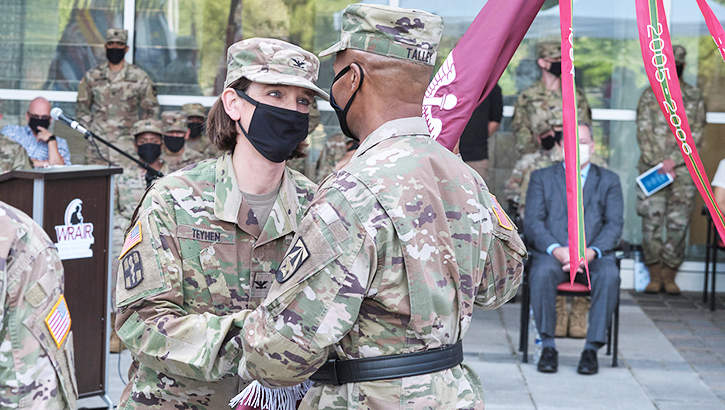WRAIR bids farewell to first all-female command team
 Army Col. Deydre Teyhen, outgoing commander of Walter Reed Army Institute of Research passes the command's colors to Army Brig. Gen. Michael Talley, commanding general of the Medical Research and Development Command. (Photo courtesy of WRAIR.)
Army Col. Deydre Teyhen, outgoing commander of Walter Reed Army Institute of Research passes the command's colors to Army Brig. Gen. Michael Talley, commanding general of the Medical Research and Development Command. (Photo courtesy of WRAIR.)
As August comes to an end, Army Col. (Dr.) Deydre Teyhen and Army Command Sgt. Maj. Natasha Santiago close the book on their time as the Walter Reed Army Institute of Research’s commander and command sergeant major.
Leading the DOD’s largest biomedical research laboratory, they presided over a changing institution that works to ensure relevant, fieldable infectious disease and brain health solutions for the Warfighter during Multi-Domain Operations (MDO); more recently, they also oversaw WRAIR’s participation in the whole-of-government coronavirus response.
“It’s been a unique honor to serve as the 46th commander of WRAIR—and, with Command Sgt. Maj. Santiago, as the first female command team in the institute’s 127-year history,” said Teyhen.
To ensure Service Members are protected from the deployment-related diseases, nearly half of WRAIR’s 2,700-strong workforce is located overseas throughout Southeast Asia, sub-Saharan Africa and the Republic of Georgia. During their tour, Teyhen and Santiago traveled extensively to visit WRAIR laboratories—both to ensure a strong command presence for overseas staff and to maintain and expand relationships with joint, interagency, intergovernmental and multinational partners.
Amidst the COVID-19 pandemic, WRAIR dove headfirst into efforts to prevent, detect and treat SARS-CoV-2 with 22 research proposals and nearly $75 million dollars in funded projects.
These efforts include developing a coronavirus vaccine currently scheduled to begin Phase 1 clinical trials in the fall; utilizing artificial intelligence to identify new COVID-19 treatments; advancing new diagnostics tests; screening more than 20,000 soldiers for pandemic-related behavioral health concerns and studying the relationship between sleep and the immune system.
Yet, a rapid pivot and ongoing response to COVID-19 is not the only point of pride from the tenure of Teyhen and Santiago; their command emphasis on relevant and aligned research allowed the institute to pivot to an MDO-driven product development mindset.
Three products that were developed or tested by WRAIR received FDA licensure—tafenoquine, to prevent and cure malaria; intravenous artesunate, to cure severe malaria and Ervebo, a vaccine for Ebola’s Zaire strain—bolstering access to fire-and-forget preventives and effective treatments against infectious disease.
A WRAIR-developed “cocktail” of bacteria-specific viruses, or bacteriophages, was used to save the life of a patient with a multidrug-resistant (MDR) bacterial infection. MDR infections of combat wounds are forecasted to be one of the most pressing threats of MDO as casualties are forced to remain in the field longer with antibiotics made increasingly ineffective due to resistance.
Additionally, WRAIR worked in partnership with the Israel Defense Forces todevelop and began implement iCOVER – a six step, peer-to-peer process for the Warfighter to mitigate acute stress reactions in combat.
Developments continued relating to the negative performance impact of sleep loss and strategies to simplify TBI diagnosis and patient stabilization prior to evacuation.
Santiago is heading to Fort Gordon, Georgia to serve as the command sergeant major for Eisenhower Army Medical Center. Army Sgt. Maj. Rodmond Churchill will be arriving this fall as the incoming command sergeant major. On August 28th, Teyhen will change command with Army Col. Clint Murray, formerly the U.S. Forces Korea surgeon; Teyhen will now serve as the director of the Military Health System Governance for the U.S. Army Office of the Surgeon General in Falls Church, Virginia.